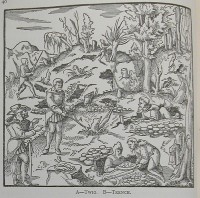1Again, between Septentrio (north wind) and the Subsolanus (east wind), the
first to the right of Septentrio (north wind) is Gallicus; then Supernas; then
Aquilo, which is the middle one of these five; next comes Boreas; and
lastly Carbas, to the left of Subsolanus (east wind). Here again, those who
do not consider the winds to be in so great a multitude, but say there are
but twelve winds in all, or at the most fourteen, assert that the wind called
 20[Figure 20]
20[Figure 20]
by the Greeks Βορέας and the Latins Aquílo is one and the same. For our
purpose it is not only useful to adopt this large number of winds, but even
to double it, as the German sailors do. They always reckon that between
each two there is one in the centre taken from both. By this method we
first to the right of Septentrio (north wind) is Gallicus; then Supernas; then
Aquilo, which is the middle one of these five; next comes Boreas; and
lastly Carbas, to the left of Subsolanus (east wind). Here again, those who
do not consider the winds to be in so great a multitude, but say there are
but twelve winds in all, or at the most fourteen, assert that the wind called
by the Greeks Βορέας and the Latins Aquílo is one and the same. For our
purpose it is not only useful to adopt this large number of winds, but even
to double it, as the German sailors do. They always reckon that between
each two there is one in the centre taken from both. By this method we
